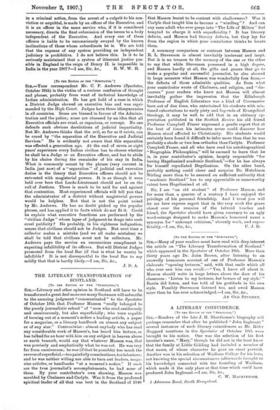THE LITERARY TRANSFORMATION OF SCOTLAND.
[To THE EDITOR T II R S P ROTATOR:]
SIR,—Literary and other opinion in Scotland will have to be transformed a great deal more ere many Scotsmen will subscribe to the amazing judgment " communicated " to the Spectator of October 19th that Professor Masson "really belonged to the purely journalistic school" of "men who read assiduously and omnivorously, but also superficially; who were capable of turning out at a moment's notice a leading article, a paper for a magazine, or a literary handbook on almost any subject or of any size." Contrariwise : almost anybody who has read any considerable work of Masson's, has heard him lecture, oi has talked for an hour with him on any subject in heaven above or earth beneath, would say that whatever Masson was, that was precisely and emphatically what he was not. He was very far from omnivorous; he was (if that be possible) too much the reverse of superficial,—too painfully conscientious, too laborious; and be was neither willing nor able to turn out leaders, maga- zine articles, or handbooks "at a moment's notice." If such are the true journalist's accomplishments, he had none of them. By your contributor's own showing, Masson was moulded by Chalmers and Carlyle. Was it from the profound spiritual leader of all that was best in the Scotland of 1840 that Masson learnt to be content with shallowness ? Was it Carlyle that taught him to become a " windbag" ? And can any sane adult who ever peeps into "The Life of Milton" feel tempted to charge it with superficiality ? It has literary defects, and Masson had literary defects, but they lay far from the region in which your contributor thinks to locate them.
A summary comparison or contrast between Masson and R. L. Stevenson is almost inevitably irrelevant and inept. But it is no treason to the memory of the one or the other to say that while Stevenson possessed in a high degree, and Masson hardly at all, the gifts and graces that go to make a popular and successful journalist, be also showed in large measure what Masson was wonderfully free from,— the defects of those admirable qualities. As from what your contributor wrote of Chalmers, and religion, and " dis- coorses " your readers who knew not Masson will almost inevitably gather the impression that the Edinburgh Professor of English Literature was a kind of Covenanter born out of due time, who entertained his students with mis- timed exhortations to early piety and fag-ends of Evangelical theology, it may be well to add that in an obituary ap- preciation published in the Scottish Review his old friend Professor Campbell Fraser expressed a gentle regret that at the best of times his intimates never could discover how Masson stood affected to Christianity. His students would certainly have found it difficult to infer more than that he was probably a shade or two less orthodox than Carlyle. Professor Campbell Fraser, and all who have read his autobiographical " Biographia Philosophica," will be amused to learn that he is, in your contributor's opinion, largely responsible "for having Hegelianised academic Scotland,"—for he has always for himself repudiated Hegelianism. On the other hand, probably nothing could cheer and surprise Dr. Hutchison Stirling more than to be assured on sufficient authority that "academic Scotland" has to any appreciable or nameworthy extent been Hegelianised at all.
Sir, I am "an old student" of Professor Masson, and for more than a quarter of a century I have enjoyed the privilege of his personal friendship. And I trust you will let me here express regret that in the very week the grave closed over the remains of the beloved teacher and friend, the Spectator should have given currency to an ugly word-coinage designed to make Masson's honoured name a synonym for "unkempt criticism," slovenly work, and super.






























































 Previous page
Previous page